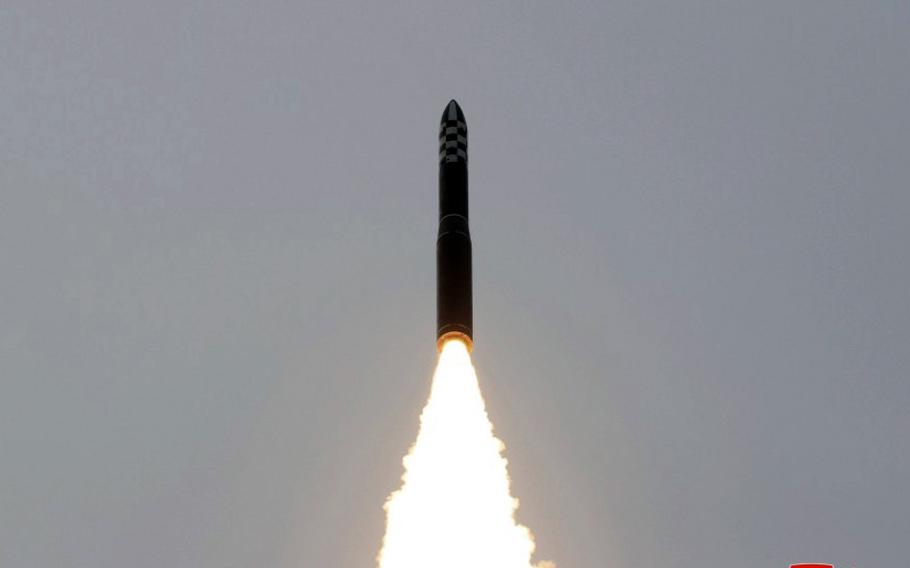
North Korea launches a solid fueled Hwasong-18 intercontinental ballistic missile on April 13, 2023. North Korea has fired an unidentified ballistic missile on July 12, 2023, according to the South’s military. (KCNA)
CAMP HUMPHREYS, South Korea — North Korea fired an intercontinental ballistic missile off its eastern coast around 10 a.m. Wednesday, according to military authorities in South Korea and Japan.
The missile was launched from the Pyongyang area at a high angle and flew about 620 miles before splashing down in the Sea of Japan, or the East Sea, South Korea’s Joint Chiefs said in a message to news reporters.
“North Korea’s launch of a long-range ballistic missile is a serious provocation that undermines the peace and stability of the Korean Peninsula and the international community,” the message said.
Japan’s military detected an ICBM being fired from near Pyongyang at 9:59 a.m. that flew for 74 minutes before splashing into the sea about 155 miles west of Okushiri Island, beyond the country’s exclusive economic zone, Chief Cabinet Secretary Hirokazu Matsuno said at a news conference Wednesday.
The missile flew at a maximum altitude of 3,730 miles, Matsuno said. No damage was reported as of Wednesday afternoon.
“We will continue to work closely with related countries, such as the United States and South Korea, and will put our utmost efforts to gather and analyze information and to monitor the situation in order to protect the lives and properties of the Japanese citizens,” Japan’s Ministry of Defense said on its website.
The ICBM launch comes nearly 1 ½ months after North Korea attempted on May 31 to launch what it called a surveillance satellite. The rocket failed and the vehicle fell into the Yellow Sea, where it was recovered by South Korea. The regime promised another attempt soon.
North Korea last tested an ICBM on April 13. The state-run Korean Central News Agency called it a Hwasong-18, the country’s first solid-fueled ICBM. The launch, which prompted Japan to warn Hokkaido residents to seek shelter, was also fired from near Pyongyang and flew 620 miles at a high angle.
Japanese Prime Minister Fumio Kishida, who is at the NATO summit in Vilnius, Lithuania, has ordered a maximum effort to gather and analyze information related to Wednesday’s launch, according to the Prime Minister’s Office.
South Korean President Yoon Suk Yeol was also at the NATO summit on Wednesday, talking to the North Atlantic allies about the threat posed by North Korea’s nuclear-weapons program, according to media reports.
Wednesday’s launch follows threats by the communist regime on Monday to shoot down U.S. reconnaissance aircraft. The North Koreans alleged that crewed RC-135 and unmanned RQ-Global Hawk aircraft violated its maritime airspace between July 2 and Friday.
Kim Yo Jong, a senior Workers’ Party official and the sister of North Korean leader Kim Jong Un, alleged Monday that U.S. military aircraft had crossed the maritime military demarcation line dividing the Korean Peninsula and into the country’s exclusive economic zone, according to KCNA.
She also warned that the regime will not be responsible for “what dangers are facing” U.S. aircraft if they continue to cross its territory.
South Korea’s military has denied the claim and said its joint aerial reconnaissance operations with the U.S. were routine.
Washington echoed Seoul’s denial and said the North’s “recent statements that U.S. flights above its claimed exclusive economic zone are unlawful are unfounded,” State Department spokesman Matthew Miller said at a press conference Tuesday.
Prior to Wednesday’s launch, North Korea had fired 14 ballistic missiles in 10 separate days of testing so far this year. The most recent launch was June 15, when the North fired two short-range ballistic missiles off its eastern coast.
North Korea has been prohibited by the U.N. Security Council from “all ballistic missile activities” since 2006, when the organization unanimously adopted resolutions to punish the regime for its first nuclear test the same year.